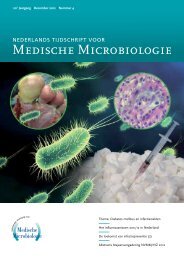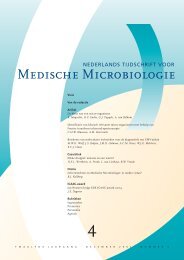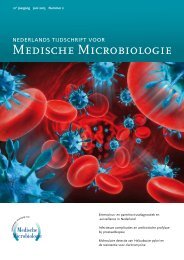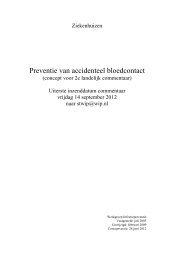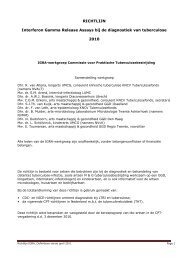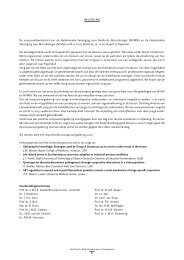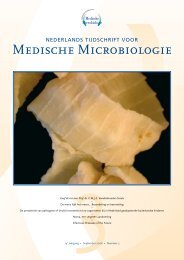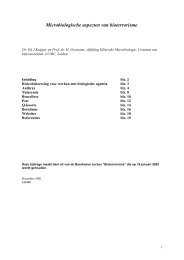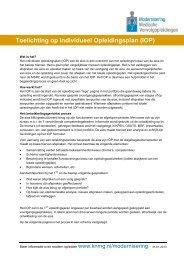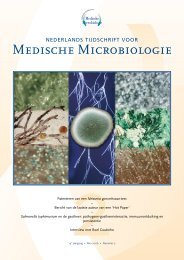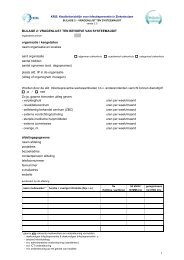Supplement bij veertiende jaargang, april 2006 - NVMM
Supplement bij veertiende jaargang, april 2006 - NVMM
Supplement bij veertiende jaargang, april 2006 - NVMM
Create successful ePaper yourself
Turn your PDF publications into a flip-book with our unique Google optimized e-Paper software.
of this spoilage without paying attention to differences in<br />
spoilage potential between individual strains. Detailed<br />
characterization of the strains causing spoilage was and<br />
is often difficult or impossible due to a lack of methods<br />
enabling sufficient resolution to distinguish between closely<br />
related strains. This research was focused on developing a<br />
novel genomics based approach called genomotyping<br />
enabling very detailed and specific discrimination between<br />
closely related strains of spoilage organisms.<br />
Methods: Bacillus spoilage organisms were studied by<br />
using a Smart Man Genomics approach. Genomic DNA<br />
of relevant strains of Bacillus species (Bacillus subtilis,<br />
Bacillus coagulans, Bacillus pumilis, Bacillus licheniformis,<br />
Bacillus sporothermodurans and Bacillus cereus) was used<br />
to construct genomic libraries which were spotted on<br />
microarrays. Genomic DNA of about 50 Bacillus strains<br />
was hybridized to these microarrays containing over 6000<br />
spots and obtained hybridization results were analyzed.<br />
Results: Analysis of obtained data resulted in selections<br />
of biomarkers (DNA fragments) enabling the following<br />
distinctions: 1) Unique markers for specific strains within<br />
one species: 2) Markers specific for one species; 3) Markers<br />
representing multiple but not all species; 4) Markers<br />
present in all species studied. DNA sequences of representative<br />
markers of all these groups have been determined<br />
and will be presented. Also data on analysis of novel strains<br />
will be presented.<br />
Conclusions: Genomotyping enables both discrimination<br />
between closely related strains of one species<br />
and multiple species in one analysis. When based on<br />
Smart Man Genomics this is a generic, flexible and cost<br />
efficient approach for studying microbial spoilage. In the<br />
forthcoming years genomotyping may result in a much<br />
better understanding of specific spoilage causing bacterial<br />
strains and thereby in improved possibilities for spoilage<br />
control.<br />
06.03<br />
Bacterial spores in food processing; molecular detection,<br />
identification and process survival analysis<br />
S. Brul1,2 , L. Hornstra1 , M. de Haan1 , S.J.C.M. Oomes2 ,<br />
A. van Zuylen4 , B.J.F. Keijser3 , F. Schuren3 , H. van der<br />
Spek1 , R. Montijn3 1<br />
Swammerdam Institute for Life Science, Molecular Biology<br />
& Microbial Food Safety, Amsterdam, 2Unilever Research,<br />
Advanced Food Microbiology, Vlaardingen, 3 TNO Quality<br />
of Life, Department of Microbiology, Zeist, 4Unilever, UBF<br />
Sourcing Unit, Oss<br />
In the food processing industry extremely heat-resistant<br />
bacterial endospores create problems due to their ability to<br />
survive classical food preservation treatments (see among<br />
others: Kort et al. AEM 2005:71:3556-64). The spores are<br />
Ned Tijdschr Med Microbiol <strong>2006</strong>; 4:<strong>Supplement</strong><br />
S33<br />
able to subsequently germinate and form actively growing<br />
vegetative cells that spoil foods and cause disease. With<br />
genomic library micro-array hybridisation we identified<br />
a number of unique genome fragements that correlated<br />
with specific strains and their thermal stress resistance.<br />
These genome fragments were converted into probes for<br />
the Check-Points DNA-chip platform in order to perform<br />
spore detection assays in real foods and food ingredients.<br />
In addition, we showed with the sequenced Bacillus subtilis<br />
laboratory strain that sporulation in the presence of a cocktail<br />
of calcium, magnesium, iron, manganese and potassium<br />
promotes thermal resistance of developing spores. This<br />
observation correlated with an increased expression during<br />
sporulation of genes encoding small acid soluble spore<br />
proteins known to be important in the protection of spores<br />
against a variety of stresses (see Oomes and Brul. IFSET<br />
2004;5:307-16; O’Brien et al., <strong>2006</strong>, proteomics manuscript<br />
in preparation). Degradation patterns of specific molecular<br />
markers upon spore thermal injury were found to be<br />
predictive for the outgrowth behaviour of B. subtilis spores.<br />
This finding was quantitatively measured and patented<br />
(Keijser, 2005). Furthermore, the molecular program that<br />
forms the basis of spore germination has been analysed<br />
using genome-wide expression analysis. Here we observed<br />
that genes involved in DNA-repair were transiently expressed<br />
in germinating wild-type spores (Keijser et al., 2005,<br />
paper in preparation). Of the genes that were specifically<br />
expressed during spore germination individual knock-out<br />
mutants were generated. Some of these mutants showed a<br />
significantly delayed outgrowth but none were completely<br />
perturbed in germination and outgrowth. Implications<br />
of this for the inhibition of germination-specific damage<br />
repair processes through mild combination preservation<br />
techniques are discussed.<br />
06.05<br />
Spore germination of thermally injured Bacillus subtilis<br />
spores<br />
L.M. Hornstra1 , B.J.F. Keijser1 , S.J. Oomes2 , H. van der<br />
Spek1 , M. de Haan1 , S. Brul1 1University of Amsterdam, Swammerdam Institute for<br />
Life Sciences, Amsterdam, 2Research Center Unilever,<br />
Microbiological Control, Vlaardingen<br />
Over the years, the food industry has developed safe<br />
food preservation methods to ensure healthy, safe and<br />
tasty food products. Gradually, consumers demands<br />
have changed to fresh-like foods were a minimum level<br />
of processing has been applied to maintain positive<br />
aspects of fresh food without compromising food<br />
safety. Unfortunately, mild processing provides opportunities<br />
for pathogenic and spoilage organisms, in<br />
particular spore forming organisms as the spores are




